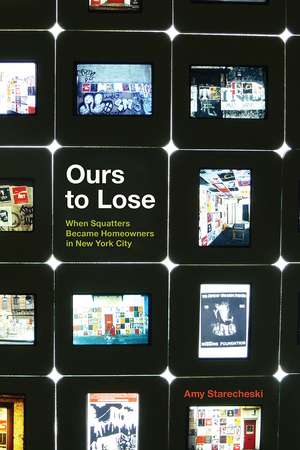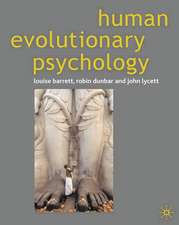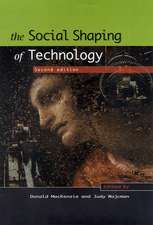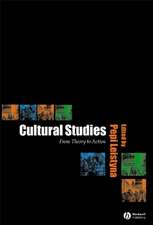Ours to Lose: When Squatters Became Homeowners in New York City
Autor Amy Starecheskien Limba Engleză Paperback – 7 noi 2016
Though New York’s Lower East Side today is home to high-end condos and hip restaurants, it was for decades an infamous site of blight, open-air drug dealing, and class conflict—an emblematic example of the tattered state of 1970s and ’80s Manhattan.
Those decades of strife, however, also gave the Lower East Side something unusual: a radical movement that blended urban homesteading and European-style squatting in a way never before seen in the United States. Ours to Lose tells the oral history of that movement through a close look at a diverse group of Lower East Side squatters who occupied abandoned city-owned buildings in the 1980s, fought to keep them for decades, and eventually began a long, complicated process to turn their illegal occupancy into legal cooperative ownership. Amy Starecheski here not only tells a little-known New York story, she also shows how property shapes our sense of ourselves as social beings and explores the ethics of homeownership and debt in post-recession America.
Those decades of strife, however, also gave the Lower East Side something unusual: a radical movement that blended urban homesteading and European-style squatting in a way never before seen in the United States. Ours to Lose tells the oral history of that movement through a close look at a diverse group of Lower East Side squatters who occupied abandoned city-owned buildings in the 1980s, fought to keep them for decades, and eventually began a long, complicated process to turn their illegal occupancy into legal cooperative ownership. Amy Starecheski here not only tells a little-known New York story, she also shows how property shapes our sense of ourselves as social beings and explores the ethics of homeownership and debt in post-recession America.
Preț: 242.60 lei
Nou
Puncte Express: 364
Preț estimativ în valută:
46.43€ • 47.96$ • 38.64£
46.43€ • 47.96$ • 38.64£
Carte tipărită la comandă
Livrare economică 25 martie-08 aprilie
Preluare comenzi: 021 569.72.76
Specificații
ISBN-13: 9780226399942
ISBN-10: 022639994X
Pagini: 344
Ilustrații: 13 halftones
Dimensiuni: 152 x 229 x 20 mm
Greutate: 0.43 kg
Ediția:1
Editura: University of Chicago Press
Colecția University of Chicago Press
ISBN-10: 022639994X
Pagini: 344
Ilustrații: 13 halftones
Dimensiuni: 152 x 229 x 20 mm
Greutate: 0.43 kg
Ediția:1
Editura: University of Chicago Press
Colecția University of Chicago Press
Notă biografică
Amy Starecheski is co-director of the Oral History Master of Arts program at Columbia University. She won first prize in the 2016 SAPIENS-Allegra competition.
Cuprins
The Narrators
The Eleven Buildings
Introduction Chapter 1: From Drug Murder to Door Ceremony: Claiming Buildings, Building Claims Chapter 2: Who Deserves Housing? The Battle for East Thirteenth Street Chapter 3: Making the Deal: Debating the Values of Housing Chapter 4: Why Work? The Values of Labor Chapter 5: Making Claims on the Past and the Future: Debt, Kinship, History, and the Temporality of Homeownership Conclusion
Acknowledgments
Abbreviations
Notes
References
Index
The Eleven Buildings
Introduction
Acknowledgments
Abbreviations
Notes
References
Index
Recenzii
"Ours to Lose chronicles the decades-long struggle of urban squatters in a cluster of buildings on Manhattan's Lower East Side to win legal control of their homes. Using oral history and ethnography, the author recounts the squatters move into the buildings during the mid-1980s when the city took title over non-payment of real estate taxes. Starecheski takes us into the process, and through interviews and her analysis, we learn that not all is smooth. What is significant is that the author demonstrates how some New Yorkers addressed the housing crisis in an unconventional manner. Recommended."
"There are many books about the Lower East Side and its recent transformation, yet none has included engagement or oral history with primary organizers in the way Starecheski has. Ours to Lose is a unique and substantive contribution to our understanding of a most distinct practice in the shaping of urban space."
"Epic wars are waged over the right to house and home, and, though it may be hard to imagine today, Manhattan was once the chaotic battleground. In Ours to Lose, Starecheski tells the fascinating and little-known tale of the Lower East Side squatters of the Eighties. For decades the now-designer neighborhood was infamous for rampant crime, drugs, and violence, but Starecheski reveals the upside of that bygone era—a radical, European-inspired housing movement, the first of its kind in America, during which a diverse group of people would transform and fiercely defend the abandoned buildings they occupied. This true account follows squatters as they fight to turn illegal living into legal cooperative ownership, redefining what it means to own property in New York City."
“Ours to Lose is an extraordinarily powerful, vivid, and multi-layered investigation of the contradictory meanings of home ownership as seen through the eyes and experiences of squatters on the Lower East Side in the 1980s and 1990s. With a deep respect for the squatters whose stories form the book’s core and with a bracingly realistic analysis of housing politics, Starecheski demonstrates how alternatives to the dominant property regime can emerge out of the creativity and persistence of people who refuse to accept its rules. Ours to Lose is both a wonderfully rich history of the forces that transformed New York’s working-class neighborhoods and a profound inquiry into what it means to treat housing as a commodity in the twenty-first century.”
“This is oral history at its best: a skillful weaving of narrative and analysis, subjectivity and hard data, passion, and theory. Starecheski achieves brilliantly the goal of representing all the nuances of a complex, even contradictory, but all-important movement and process in the struggle for democratic rights and a livable city.”
“Ours to Lose chronicles the experience of squatters who labor against formidable odds to claim space and citizenship within the neoliberal city. Combining oral history and ethnography, Starecheski offers a remarkably candid account of how our private property regime operates to enrich the wealthy, indebt the majority, and exclude the vulnerable—yet how alternative possibilities can nonetheless take root within the interstices of capitalism itself. This is a hard-hitting and important book.”
“This original ethnography of a successful group of Lower East Side squatters in what is considered the ultimate luxury city—downtown Manhattan—turns the right to the city into an ambivalent struggle to gain property rights. It examines how residents’ political commitments to collective and inclusive values are confronted by difficult choices and hard work in an effort to retain abandoned housing that is home to poor and otherwise homeless friends and families. The social dynamics of squatters transformation into owners is described with compassion and pride as Starecheski faces the contradictions inherent in this housing conversion.”











